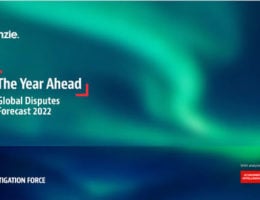The most comprehensive guide of its kind, the Global Attorney-Client Privilege Guide is an interactive resource covering the law and best practices on privilege in 34 key jurisdictions.
The up-to-date understanding of the law of privilege found in the Guide helps companies to maximize the available protections and ensure that, where possible, privilege is maintained.
When litigation is threatened, companies whose employees know how to recognize and protect privileged information are better prepared to respond to the risks.
We are sharing an episode from the FInsight podcast series as part of the UK Disputes Soundbites series, because of its interesting findings, predictions and exploration of trends in the evolving disputes landscape, with reference to our fifth annual report, The Year Ahead: Global Disputes Forecast 2022.
Hear partners Amy Greer (New York), Marc Thorley (London) and Carolina Duque (Bogota) discuss key findings relevant for financial institutions and the factors driving the increase in disputes and emerging concerns related to liabilities. They also cover litigation around digital transformation, tax, ‘business-as-usual’ conduct, and; new environmental, social, and governance (ESG) standards.
In response to increased global enforcement, Baker McKenzie partners developed their unique Investigations Academies, a highly practical and interactive offering that serves to train and educate clients in all aspects of dealing with internal and regulator-imposed investigations. These bespoke training sessions are designed to enhance a company’s existing compliance program and are targeted at increasing awareness within the compliance and legal functions, as well as the broader business leadership group, including HR, finance, commercial, IT and procurement. Click here to access the Investigations Academies brochure.
US partners and former US Department of Justice prosecutors William Devaney and Tom Firestone discuss with UK senior associate Andrew Matheson the ins and outs of the US approach to prosecuting companies and, perhaps more importantly, how that approach could be improved upon.
Our fifth annual report, The Year Ahead: Global Disputes Forecast 2022, and webinar series address key trends in the disputes landscape around the globe.
Baker McKenzie’s Government Enforcement Practice Group would like to wish you a Happy New Year. We have all taken some time off for the holidays, and a lot has happened in the interim. Perhaps most significantly, Congress passed, over President Trump’s veto, the National Defense Authorization Act for Fiscal Year 2021 (NDAA). The most ballyhooed aspect of the NDAA, from a white-collar criminal law standpoint, has been the de facto elimination of anonymous shell companies — The Corporate Transparency Act, which is discussed below. However, the NDAA also included a number of other key provisions buried in the text, which are certain to assist the Government in its prosecution of white collar crime as well as increase compliance obligations on businesses. We have put together this note to clients and friends for the purpose of quickly updating you on these developments in a single document.
READ REPORT IN ENGLISH READ REPORT IN SPANISH READ REPORT IN MANDARIN The Year Ahead – our publication looking at key developments in global litigation and arbitration for 2021 – is now available in English, Spanish and Mandarin. COVID-19 and its effects have triggered many disputes, with litigation volumes in…
Baker McKenzie’s Government Enforcement Practice Group would like to wish you a Happy New Year. We have all taken some time off for the holidays, and a lot has happened in the interim. Perhaps most significantly, Congress passed, over President Trump’s veto, the National Defense Authorization Act for Fiscal Year 2021 (NDAA). The most ballyhooed aspect of the NDAA, from a white-collar criminal law standpoint, has been the de facto elimination of anonymous shell companies — The Corporate Transparency Act, which is discussed below. However, the NDAA also included a number of other key provisions buried in the text, which are certain to assist the Government in its prosecution of white collar crime as well as increase compliance obligations on businesses. We have put together this note to clients and friends for the purpose of quickly updating you on these developments in a single document.
Connected Compliance explores the role of technology as a driver of compliance integration and business growth. We conduct research annually with decision-makers to understand the pace and extent to which companies are deploying technology to manage compliance challenges as well as the risks associated with connected compliance among wider business…
The US legal system is not virtual. As the Supreme Court has stated, the right to in-person confrontation has “a lineage that traces back to the beginnings of Western legal culture.” Reminders of the importance of physical presence in the courtroom are everywhere: the Constitution guarantees the right to trial by jury, the Supreme Court has held that there is a qualified First Amendment right to attend court proceedings, and out-of-court statements are generally inadmissible. These are only a few examples. But what happens when these important rights collide with equally important public health considerations? Are virtual solutions legally permissible/technically possible/strategically desirable? Will today’s temporary work-arounds become tomorrow’s best practices? Is remote litigation the wave of the future? What risks and opportunities does it present?







